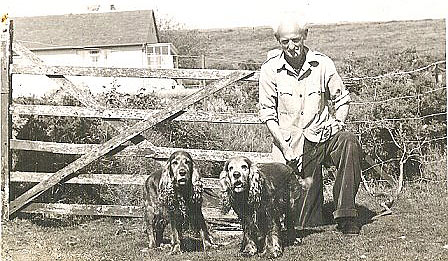REX HARDINGE: AUTHOR AND EXPLORER
Josie Packman

Rex Hardinge has always been one of my favourite authors especially so when he wrote his African tales. Long before he wrote his first Sexton Blake story he had travelled much in Africa so was able to give his stories authentic backgrounds. I came across a statement made by the Editor in Union Jack No. 1,517, to the effect that Mr. Hardinge's first story for the U.J. was called "THE VICTIM OF THE VELDT" which appeared in U.J. No. 1,285. This we know was wrong as the first story was "THE BLACK CLOUD" which appeared in the U.J. No. 1,265, dated 14 January, 1928. Many years later this story was re-written and appeared in the Sexton Blake Library 3rd Series, No. 283, under the title "THE AFRICAN HOODOO." However, I decided to make this article one about Rex Hardinge the Explorer, so I have extracted part of the Round Table featured in the U.J. No. 1,530, dated 11 February, 1933:
Readers who are interested in our Lobangu stories and the man who writes them will remember that I revealed earlier that Rex Hardinge was about to start for Africa on an exploring expedition. This was organised for the purpose of taking a party across Africa from West to East, and to secure sound pictures of native life war dances, ju-ju feasts and so forth. From the starting place on the West Coast, Dakar, the line of march was to traverse French Guinea and the Ivory Coast; Ashanti, Nigeria, and the Cameroons; the Sudan, Uganda, Kenya and Tanganyika.
According to the Editor, there was a hitch in the plans but Rex Hardinge set out alone and arrived at Dakar after 20 days in a steamship where he was the only Englishman aboard. His last letter home from Dakar was to the effect that he was leaving that place on the morrow and would send further letters as soon as possible. He had left behind him with the Editor some stories for the U.J. but as No. 1,530 was the next to the last Union Jack printed no one knows what happened about them, neither did we ever learn what happened on the trip to Africa.
However, we do know that Mr. Hardinge returned safely, as so many of his Sexton Blake stories of later years appeared in the Sexton Blake Libraries. We can believe that all his African ones had been written by a man with first-hand knowledge of the country. (It would appear that there in nothing new under the sun: Mr. David Attenborough was not, after all, the first man to take moving pictures of the African jungles and the animals and people living in them!)

